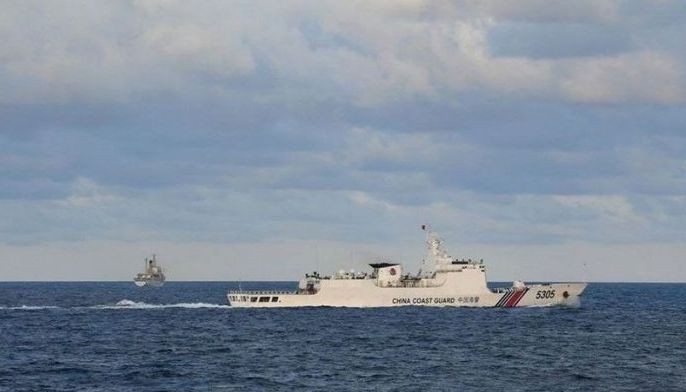MANILA, Philippines — Two Chinese research vessels spotted “loitering” and doing research in the Philippine Rise, in the Philippines’ eastern seaboard, have left the country’s exclusive economic zone (EEZ), the Philippine Navy said yesterday.
In an interview on dzBB, Philippine Navy spokesperson Commodore Roy Vincent Trinidad said the Chinese vessels have been monitored as being out of the EEZ, and that bad weather has prevented any air surveillance flight over the area by naval forces in Northern Luzon.
“We would have sent out an air surveillance flight by naval forces from Northern Luzon, it just so happened the weather was bad as of the other day, but they will make another attempt. Although, as of yesterday at 3 p.m., we monitored that they (Chinese vessels) were already out of the EEZ,” Trinidad said.
He said the surveillance mission will determine if the Chinese vessels would be spotted around Benham Rise.
The monitoring and surveillance in the area, according to Trinidad, is almost 24/7.
“Our presence has not yet reached that far, because it is farther and more remote in the ocean compared to our West Philippine Sea detachment,” Trinidad said.
In a post on X, American maritime expert Ray Powell said the two Chinese research vessels were in the northeast corner of Benham Rise within the Philippine EEZ.
Based on satellite images, Chinese research vessels Haiyang Dizhi Liuhao and Haiyang Dizhi Shihao left the port at Longxue Island in Guangzhou on Feb. 26, and moved east southeast through the Luzon Strait.
China: Phl stirring ‘trouble’
China accused the Philippines of teaming up with the US and other countries outside of the region to stir trouble in the South China Sea, severely violating a non-binding code of conduct in the South China Sea, which Beijing had already broken in carrying out reclamation work.
A statement of China’s Ministry of National Defense posted on the Chinese embassy in Manila’s Facebook account was made following a Philippine Coast Guard (PCG) report that its patrolling vessels had been closely approached by China Coast Guard (CCG) vessels.
The Chinese Defense Ministry warned that “China will respond resolutely to any action in the South China Sea that infringes on its legitimate rights or is provocative in nature.”
“The Philippines has teamed up with countries outside of the region to stir trouble in the South China Sea, which severely violates the spirit of the Declaration on the Conduct of Parties in the South China Sea and jeopardizes regional peace and stability,” Defense Ministry spokesperson Zhang Xiaogang said.
He stressed that the US is irrelevant to, and should uphold its commitment to not taking a position on, the South China Sea issue.
The Armed Forces of the Philippines said the joint Philippines-US air patrol over the West Philippine Sea was aimed at protecting national interests and territory.
The Philippines and Australia signed last week an agreement to boost collaboration on maritime security, including “promoting respect for international law.”
CCG vessels have repeatedly intruded into the waters of Panatag (Scarborough) Shoal or Bajo de Masinloc – which China calls Huangyan Dao – over which the Philippines has indisputable sovereignty.
The PCG confirmed on Tuesday the presence of Chinese warships and aircraft in the vicinity of Bajo de Masinloc.
“China will continue operations of rights protection and law enforcement in the waters under its jurisdiction,” Zhang said.
Calling the South China Sea a shared home of the countries in the region, Zhang said China is resolved to manage differences with relevant countries through dialogue and consultation.
Chinese embassy hits Phl envoy to US
The Chinese embassy in Manila deplored yesterday Philippine Ambassador to Washington Jose Manuel Romualdez’s recent remarks on the South China Sea, saying it “disregarded basic facts” and urged him to refrain from serving as “mouthpiece” for another country.
“It is deplorable that the said individual, in ignorance of basic facts, again used the South China Sea issue to hype up and launch a baseless accusation and malicious smear campaign against China,” the embassy said in a statement, referring to Romualdez.
The embassy said that bringing in outside forces and forming “small circles” will not help resolve disputes in the South China Sea, but only complicate the regional situation, undermine regional peace and stability, and backfire on its own security.
Romualdez said the real flashpoint is in the South China Sea.
The embassy also rejected the ambassador’s remark that the Philippines faces China’s aggression in the South China Sea, and needs to band together with like-minded countries such as the US and Australia to jointly resist aggression and constrain one country from prevailing upon another through force.
“For those who habitually pay lip service, whether their promises will be kept this time is for all to wait and see,” the embassy said.
“We urge the said individual to stop spreading erroneous China threat and Sinophobia remarks, refrain from serving as mouthpiece for another country and do more for the benefit of his own people and his country’s relations with China instead,” it added.
President Marcos said the presence of Chinese navy vessels in the West Philippine Sea is “worrisome,” but the Philippines will not be deterred in defending its maritime territory and protecting its fishermen.
During a state visit last week, Marcos told Australia’s parliament that the Philippines was on the “frontline” of maritime disputes of a battle for regional peace and the country “will not yield.”


